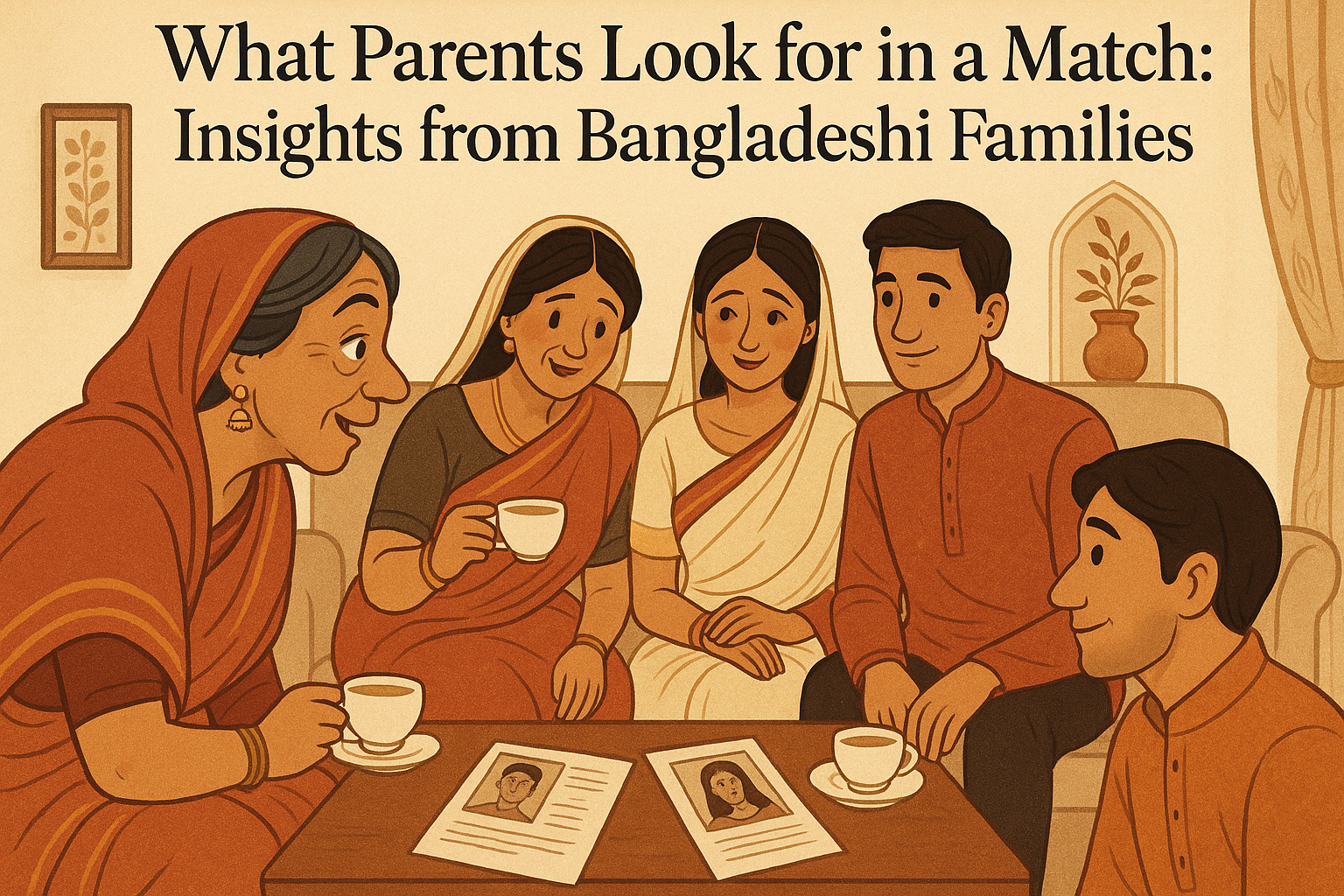
What Parents Look for in a Match: Insights from Bangladeshi Families
Introduction: Biodatas, Banter & the Bengali Balance
Ah, the sacred biodata—part résumé, part matrimonial
horoscope, all held together by glossy passport photos and family expectations.
In Bangladesh, while love stories may be brewing over Instagram DMs and coffee
shop encounters, it’s still the parents who often hold the final matchmaking
trump card.
But what exactly do Bangladeshi parents look for in a
match? Is it a six-figure salary, a master’s degree, or simply a shared love
for shutki and saarir bhaat? Let’s unravel the mystery with
respect, warmth, and just the right dash of humor.
Family & Social Standing: The First Filter
Before your GPA or prayer habits come into play, the very
first question from prospective in-laws is often:
“What’s their family like?”
In Bangladeshi culture, marriage is not just between two
individuals; it’s between two families (and sometimes, two entire villages). A
family with good repute, proper manners (bhalo chhele/beti), and decent
socio-economic footing sets the stage for an acceptable match.
And yes, your cousin’s shoshur being a government
official can sometimes tilt things dramatically in your favor. Nepotism? Maybe.
Cultural norm? Absolutely.
Education & Professional Stability: Degrees Over Drama
In most middle to upper-middle-class Bangladeshi families, education
is not just valued—it’s practically romanticized.
Whether it’s a BBA from Dhaka University or a PhD from
Canada, degrees act as symbols of not just intelligence, but security. Job
stability is another non-negotiable—especially for grooms. No parent wants
their daughter married to a dreamer with a YouTube channel and zero earnings
(unless the YouTube channel is monetized, of course).
Pro tip for grooms: The words “engineer,”
“doctor,” and “software developer” on your biodata are like golden
keys to the matchmaking kingdom.
Religion, Values & Cultural Compatibility
In a country where over 90% of the population is Muslim, religion
plays a significant role in matchmaking. Families often seek partners who
are not only from the same faith, but also share a similar level of religious
observance.
A hijabi bride with a tech job? Jackpot. A groom who attends
Friday prayers and sends Eid salami to his in-laws? Certified son-in-law
material.
Also, compatibility in dialects (Sylheti vs. Dhakaiya), food
preferences (team pulao or biriyani?), and regional roots
(Noakhali vs. Rajshahi) subtly influence decisions.
Age & Gender Dynamics: The “Right Time” Theory
Bangladeshi parents often have a pre-installed calculator
that decides the perfect age gap between spouses—usually between 4 to 7
years, with the groom being older.
For brides, being in the early-to-mid twenties is ideal.
Past 28? You’ll hear phrases like “ekhon boro bhalo meye hoileo chinta kore
dekhe” (translation: even good girls are now seen with hesitation). Harsh?
Perhaps. Honest? Also yes.
And let’s not tiptoe around it—having a son in the
family still carries weight. Some parents favor grooms from families with sons,
fearing daughters may be overburdened as the only bou.
Dowry & Financial Considerations: The Elephant in the Room
Though legally banned, the dowry system (joutuk) still
silently persists in many Bangladeshi marriages. Often disguised as “gift
culture”, it can range from furniture sets and gold jewelry to motorbikes
and apartment bookings.
While urban, educated families are actively challenging this
archaic practice, it's not entirely gone. For many parents, financial
capability still remains a major factor—whether it’s owning land in the
village, an apartment in Dhaka, or at least the promise of not living with the shoshur
bari forever.
Family Compatibility: The Final Test
You might be Harvard-educated with killer dimples, but if
your mother doesn’t get along with her future bouma’s mother, all bets
are off.
Family compatibility includes everything from shared
values and similar parenting styles to who makes better shingara and who
gets the last word at family gatherings. While some parents focus on tradition,
others look for open-minded in-laws who will support their child’s dreams and
boundaries.
Bonus points if the bride can make a mean cup of milk tea
and tolerate two-hour phone calls from shoshuri every week. (Kidding…
sort of.)
Conclusion: The Checklist vs. the Heart
At the end of the day, parents want what they believe is
best: security, respect, shared values, and a peaceful home. Their
checklist—though sometimes rigid—stems from love, fear, and hope.
However, modern Bangladeshi families are gradually embracing
a middle path—where traditional values meet modern flexibility. Many now
prioritize emotional intelligence, mutual respect, and even (gasp!) love.
Whether your path to marriage starts with a ghotok, a
Facebook group, or a serendipitous meeting at a wedding buffet, remember—what
matters most is building a partnership where both hearts (and both families)
feel seen.
FAQs: Real Talk with Real Answers
Q1: Do Bangladeshi parents still insist on dowry?
While illegal and increasingly frowned upon, dowry still exists in subtle
forms. However, more families are actively rejecting it.
Q2: Is love marriage acceptable now?
In urban areas, love marriages are gaining acceptance, especially when family
values align. Rural regions may still hold reservations.
Q3: How do matrimonial sites affect parental
expectations?
They’ve introduced more choice and flexibility, but parental screening remains
deeply embedded in the process.
Q4: Are parents open to cross-regional or intercaste
matches?
It depends on the family’s level of tradition, religion, and exposure—but it’s
becoming more common in cities.